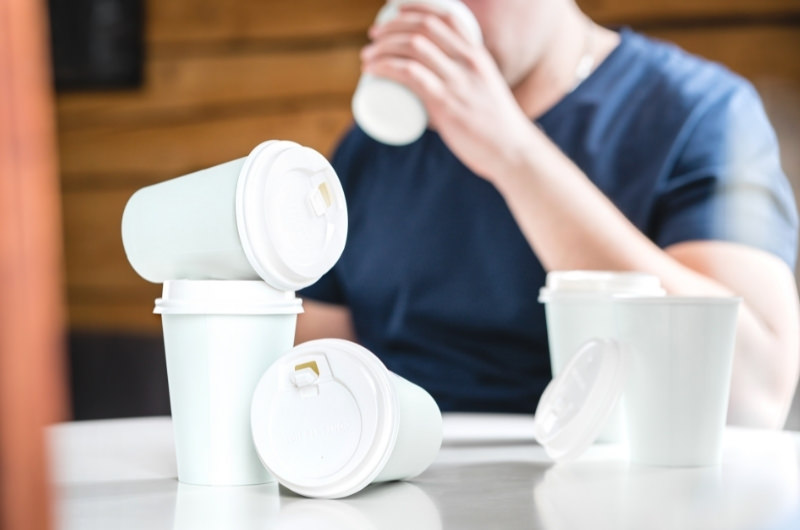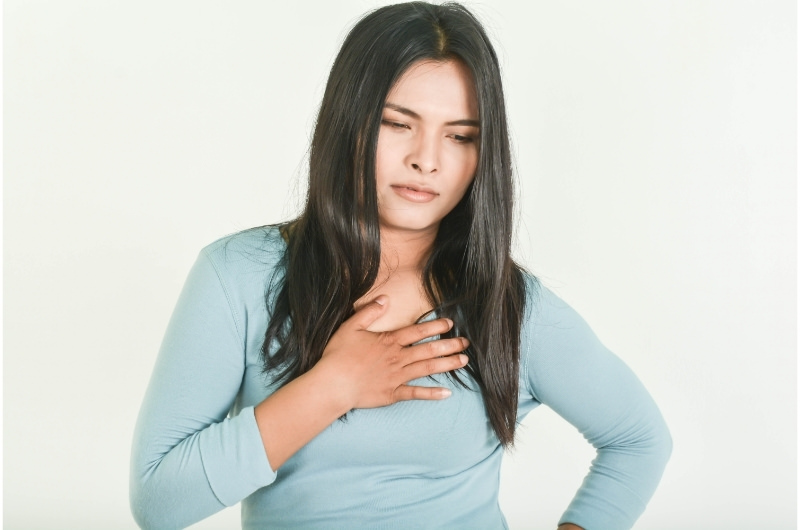Coffee can cause nausea for various reasons, such as drinking on an empty stomach, its acidic nature, dehydration, caffeine overdose, sensitivity, or additives like milk and sweeteners. According to the Mayo Clinic, the recommended amount of caffeine is up to 400 milligrams per day for healthy adults.
Your caffeine sensitivity might be caused by multiple factors, from the hot water increasing acidity levels to an increased intake of caffeine per day.
Understanding the underlying cause and finding the right solution can help you enjoy your coffee without feeling nauseous.
Caffeine helps you stay alert, but it can also impact your digestive system. Let’s explore the reasons behind coffee-induced nausea and potential solutions.
Coffee and caffeine: A double-edged sword

Don’t you just love that cup of hot coffee on winter mornings? And there is definitely nothing better than a cold coffee on summer evenings.
Coffee contains caffeine, which is a great stimulant that works on our brain and central nervous system, helps you stay alert prevents us from getting tired.
As good as it sounds and feels after having a cup of coffee, be it hot or cold, there are various strings attached to having coffee, one of which is feeling nauseous.
But why do you feel nauseous? Suddenly out of the blue, why might you get nausea when you haven’t before? Let’s take a look at how this happens!
How can coffee cause nausea?
1. Early morning coffee
If you enjoy your morning coffee without having any food first, it may be the cause of your nausea.
Coffee can be quite potent, and some people may experience digestive issues, including nausea, increased heart rate, and nervousness when consuming it without food.
Coffee is an intense drink. For some people, if you don’t accompany it with some food, then you’re going to face problems such as nausea, increased heart rate, vomiting, and nervousness.
This delicious drink is complex in nature, so it will cause your stomach lining to thin out if you don’t consume food with it.
Solution: Always have something while you drink your coffee, be it 2-3 biscuits even, but eating something will prevent you from feeling nauseous and other side effects.
2. Acidic nature
Coffee is acidic in nature.
As coffee contains caffeine, which is a stimulant, it pushes your stomach to work a little harder and, as a result, produces more acid than necessary.
Another common reason for feeling nauseous is the acidity produced by caffeine in coffee. It ranges from 4.5 to 5.5 in terms of pH, which is more than the normal 1.5 to 2.5 pH required to maintain digestive health.
Try to see if this happened because of some change in the routine of food habits; if not, you might need to find other ways to still drink coffee but not feel nauseous.
Solution:
- Cold brewing coffee in cold water reduces the acidic level of the drink by 66%.
- Consider using low-acid coffee beans or darker roasts, which generally contain less acid.
- If you occasionally experience acidity, try eating a banana, which can help neutralize the excess acid.
3. Dehydration

Dehydration is the biggest cause of feeling nauseous.
It turns out that drinking enough water is not only helpful to your skin but also important for someone who drinks coffee on a daily basis.
Caffeine is diuretic in nature that increases urination frequency. Caffeine increases blood flow to your kidneys, which makes them release more water through urine. For someone who loves to get themselves around 5 cups of coffee a day, dehydration may be the cause of your nausea.
Solution:
- Increase your daily water intake, and try drinking a glass of water before your coffee.
- Limit your coffee consumption to avoid dehydration.
- Consider drinking instant or decaf coffee, which contains less caffeine.
4. Caffeine overdose

If you think there’s nothing like too much coffee, then you, my friend, could not be more wrong! Yes, caffeine overdose is a thing, and it’s called “caffeinism,” which is caused by toxic levels of caffeine.
Taking too much caffeine can cause you to have nausea, diarrhea, indigestion, irregular heartbeat, lightheadedness, jitteriness, etc.
Be aware of caffeine in other products you consume, as it can also contribute to your daily intake.
Solution:
- Explore caffeine alternatives like exercise, smoothies, tea, or cold drinks.
- Read the labels of the products you consume to monitor your caffeine intake.
5. Caffeine sensitivity
Generally, people can consume 200 to 400 mg of caffeine in a day without any issues. But people with caffeine sensitivity are different as they might not tolerate caffeine intake at all, or maybe just a small amount.
They might experience issues like nausea, racing heartbeat, headache, jitters, restlessness, and insomnia.
For people with caffeine sensitivity, even consuming a small amount can feel like consuming about 4-5 cups of coffee at a time, depending on person to person.
Solution:
- Maintain a diary where you mention your total caffeine intake daily, not just from coffee but from other products.
- You can monitor your caffeine intake and consult a doctor if necessary.
6. Milk and sweetener

Taking milk and sweetener with your coffee on a daily basis? Or did you just start adding both? Both can cause irritation to your stomach and might be the reason behind your nausea.
Artificial sweeteners might be upsetting your gut, or you might be lactose intolerant. If not lactose intolerant, even the non-dairy, low-fat, and artificial creamers might be causing your nausea.
Solution:
- Start drinking black coffee or switch your milk to plant-based.
- Avoid artificial sweeteners as much as you can. Notice if avoiding sweeteners help you out or not.
Is it coffee-related nausea or something else?
We have listed down a few remedies to get rid of that sick feeling in your stomach. Ideally, it is better to try both of the methods shown in the chart below.
| Coffee-related nausea remedies | Try taking deep breaths since getting anxious will only aggravate your nausea. |
|---|---|
| Place a cool compress, like an ice pack or a wet cloth, on the back of your neck for a few minutes. Having a high temperature could lead to nausea, so the cool compress helps to avoid this. | Place a cool compress, like an ice pack or a wet cloth, on the back of your neck for a few minutes. Having a high temperature could lead to nausea, so the cool compress helps to avoid this. |
| Try taking deep breaths, since getting anxious will only aggravate your nausea. | Drinking a hot cup of chamomile tea provides a sedative feeling that would send you right to sleep when you’re nauseous. |
| Take a walk so that you can calm yourself by spending that built-up energy. | Lemon and ginger are home remedies. Make yourself a hot ginger tea or some lemon juice as even its scent will help ease nausea. It’s best to take small sips as drinking too much, too fast can only worsen the situation. |
| Don’t lie down. Sit up straight. Gastric juices find it easy to rise up your body when you’re laying down. | Eat a small bland meal to stop yourself from excess nausea and vomiting. The best meal to take in these situations would be rice, toast, a banana, or plain/ mashed potatoes. Make sure you refrain from all diary products as we mentioned earlier. |
These remedies should have you feeling like your old self in no time. They might also give you a notion as to why you suddenly experienced nausea.
Other possible side effects of drinking coffee

We all metabolize caffeine and its other compounds at different rates. So the effects can differ from person to person, especially since it’s related to different digestive-system-related discomforts. But here are some other side-effects caused by drinking coffee, usually excessively.
- Diarrhea – The stimulant caffeine in excess amounts can make a person have more bowel stools, resulting in diarrhea. And if you are additionally dehydrated, then it could even cause constipation.
- Stomach pains – The caffeine element may increase the acid production in your stomach and act as an irritant, causing a churning sensation in your stomach.
- Vomiting – This is one of the final results of excessive nausea. You can remedy this by minimizing this feeling as directed before, or you can let yourself vomit. You will find relief afterward.
- Heartburn – Caffeine, while relaxing the esophagus, can end up aiding gastroesophageal reflux. This may result in heartburn if you’re someone that is already struggling with gastritis.
- Dizziness – Hypersensitivity to caffeine can cause a certain sense of dizziness in you as well. It’s best if you can drink water to fight this feeling off.
- Muscle spasms – Drinking too much coffee can hype up your body more than it can handle, causing your muscles to cramp.
Can I feel nausea due to a coffee allergy?
Having a small side-effect of coffee is entirely different from being allergic to coffee. So how do you identify the two from each other? What exactly are the symptoms of an allergy to coffee? It’s best distinguishable through the chart given below.
| Symptoms of Coffee sensitivity | Symptoms of Coffee allergy |
|---|---|
| Nausea & uneasiness | Shortness of breath |
| Insomnia, since caffeine can give you the energy to pull an all-nighter. | Intense stomach cramps |
| Uncontrollable muscle spasms | Extreme dizziness. This may even result in you falling unconscious. |
| Increase in your heartbeat. | A bad cough and sudden wheezing |
| Mild stomach aches. Your skin may turn pale. |
Apart from this, you need to be aware of a few symptoms that arise when you’ve just had way too much coffee.
You might feel extreme numbness, experience flu-like symptoms, hallucinations, intense mood swings, or migraines.
A study conducted in 2015 reconfirmed that caffeine can interfere with sleep efficiency and REM patterns. If you are going through any of these, it might be your body suggesting that you lay off coffee for a while.
Is there any alternative for coffee?
If coffee is troubling you with unhealthy side effects such as nausea, there are a couple of drinks that you can replace your cup of coffee with.

These substitutes contain little or no caffeine, ensuring you won’t experience any adverse effects. They also provide the energizing benefits you want and need to stay active throughout the day.
- Decaf Coffee – If you can’t imagine giving up coffee but struggle with nausea, decaf coffee could be the ideal choice. With minimal caffeine content, it offers a satisfying alternative for coffee enthusiasts.
- Chamomile Tea – For those willing to part with coffee, chamomile tea is an excellent, caffeine-free herbal option. This energizing and healthy tea is a perfect replacement.
- Coconut water – If you’re open to swapping your coffee for a natural and nutritious option, coconut water is your best bet. Its sweet flavor is a refreshing change from the bitterness of coffee. Coconut water not only provides an instant energy boost but also improves blood pressure and supports kidney function over time.
- Golden Milk – Despite its name, this beverage is dairy-free and made from turmeric, ginger, and cinnamon, eliminating any risk of nausea. It acts similarly to coffee by combating fatigue with its energizing turmeric content. In the long term, golden milk promotes brain function and helps reduce inflammation.
FAQs
What foods get rid of nausea fast?
You can make a list of things to help with your nausea, such as drinking cold water/milk, eating bland food (alkaline in nature), and banana.
You should eat slowly and in smaller bites and frequently.
Why does coffee suddenly upset my stomach?
Try to drink your coffee in smaller sips rather than gulping it down fast, which can cause nausea, stomach ache, and other related problems.
What causes sudden caffeine intolerance?
A lot of factors are related to causing intolerance for coffee in your body.
You might be sensitive to caffeine or even allergic. Your genetics might be responsible, or your liver might not be able to metabolize caffeine.
To summarize
The enticing aroma of coffee often tempts us from the moment we wake up. While some people forgo breakfast and begin their day with coffee, this approach may not be suitable or advisable for everyone.
Numerous factors could be causing coffee-induced nausea, ranging from excessive caffeine consumption to inadequate hydration. However, as long as you monitor your daily caffeine intake and drink coffee correctly, nausea shouldn’t be a significant concern.
As you keep an eye on your caffeine consumption today, I’ll go and enjoy a cup of coffee myself!
References
- https://www.healthline.com/nutrition/does-coffee-dehydrate-you
- https://www.medsafe.govt.nz/profs/puarticles/caffeine.htm#:~:text=Caffeine%20overdose%20can%20cause%20nausea,reduced%20alertness%20and%20depressed%20mood.
- https://coffeebros.com/blog/does-coffee-upset-your-stomach-heres-what-you-can-do-about-it/


